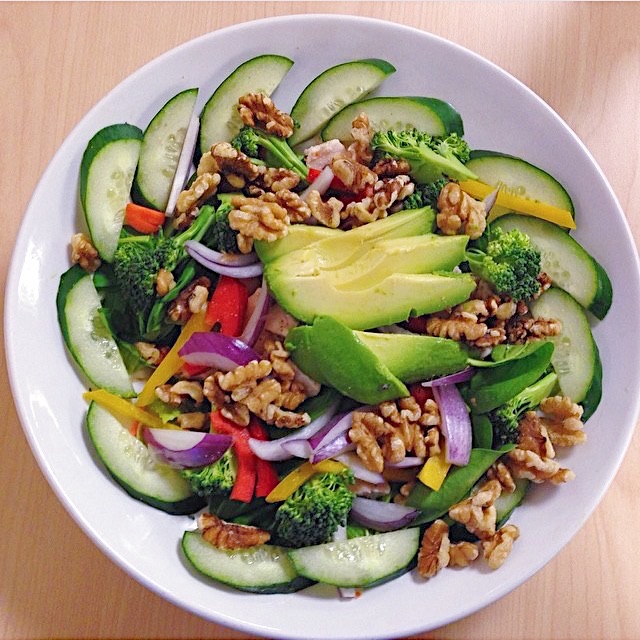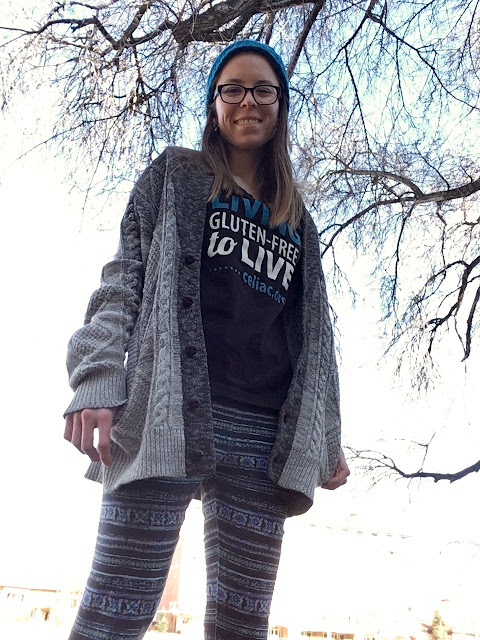Have Celiac Disease? Going to College? How to Be Gluten Free in College
So you've done the celiac disease test, started the celiac disease diet and have begun to get used to saying, "I have celiac disease." But maybe you're less certain about how to be gluten free in college - or how you can thrive with college in celiac disease.
My sophomore year, the cafeteria management changed hands. I met with the new manager and he promised that my special meals would still be available. After two weeks of arriving and either finding nothing but a salad - or, sometimes, no safe gluten free food for me at all - I knew I needed to cut my losses. I petitioned for a meal plan waiver since all students were required to pay for a meal plan. Thanks to my celiac disease documentation (and a few scathing emails), my petition was granted and I received a refund to spend on my own food.
However, I also learned how to adapt. I became a master at coming up with gluten free packed lunch ideas - not to mention countless other easy gluten free college meals - that looked even better than the pepperoni pizza everyone else was enjoying. I got used to declining food with a short comment like, "Thank you, but I have celiac disease and need to eat gluten free." And, as the years past, people remembered my "special diet" and were no longer surprised when I showed up with a smile and a small cooler of food.
Yet, the friends I did make never failed to make me feel loved and "normal." When I moved into an on-campus apartment with three other girls, they were happy to give me my own section of kitchen cabinets and shelves in the fridge. When I went out to eat with friends, we went to places like Stacked: Food Well Built where I could eat gluten free without worry. And neither of the two guys I ended up dating ever complained about having to brush their teeth before kissing me or eat at particular restaurants on date night.
Today, I'm sharing my most comprehensive post yet about being a gluten free college student. As you may know, I was diagnosed with celiac disease only a few months before going to college, and I started Casey the College Celiac because I couldn't find many "gluten free in college" blog posts.
What should you know about eating gluten free and thriving with celiac disease in college? Here are five experience-based tips on how to be gluten free in college!
* Note: I am basing this information off of my experience at Point Loma Nazarene University. Colleges may vary in their gluten free protocol and accommodations, so please research each of your chosen colleges as well as using these celiac disease tips.*
1 Research your potential colleges before attending (or even applying!) about their gluten free protocol.
By the time celiac disease entered my life, I'd already been accepted to Point Loma Nazarene University, so my celiac disease diagnosis didn't have any impact on my college decision. If you're diagnosed before college application time, though, I'd definitely consider your dietary needs in your decision.
Why? Well, celiac disease accommodations vary greatly between schools. For instance, my small religious university only has one cafeteria with a single, small "gluten free" station (that is open to the public). However, other colleges - like Kent State and Cornell University - have 100% gluten free college cafeterias. Talk about earning an A+ in celiac disease diet protocol!
Maybe you've already been accepted somewhere or maybe you are still narrowing down your college choices. Either way, reaching out to each college's cafeteria and Disability Resource Center (or its equivalent) is an important step. You can research colleges' gluten free meal options ahead of time by looking at their websites. However, you can learn important specifics - like the cafeteria's understanding of cross contamination and their meal plan flexibility - by actually talking to the college cafeteria's manager or to a representative from the DRC.
In my case, I arranged a meeting with the head of the DRC and the head chef on the day I moved into Point Loma Nazarene University. This way, I got to set up a gluten free game plan before the semester actually started. Don't be afraid to ask for a face-to-face meeting with the people who'll be responsible for your gluten free diet plan. It's their job to feed you safely, and they probably can't do that without understanding exactly what you need.
2 Documentation may be necessary for accommodation.
One of the most controversial aspects of the celiac disease test is the endoscopy. I often get questions like, "How important is having an official celiac disease diagnosis?" I can't speak for all colleges but, in my experience, I needed official celiac disease documentation - including the blood test, biopsy and a note from my doctor - to receive any gluten free accommodations.
What did those celiac disease accommodations look like? My college had a gluten free section in the cafeteria, but since everyone could eat from it, it was definitely not cross contamination free. So, my freshman year, I would send my gluten free meal plan request for the week to the head chef and he would make all my meals separately. I would then walk up to the cafeteria counter, tell the server that Casey was here for her gluten free meal and receive my lunch or dinner in plastic wrap.
 |
| A salad from my freshman year of college! |
My sophomore year, the cafeteria management changed hands. I met with the new manager and he promised that my special meals would still be available. After two weeks of arriving and either finding nothing but a salad - or, sometimes, no safe gluten free food for me at all - I knew I needed to cut my losses. I petitioned for a meal plan waiver since all students were required to pay for a meal plan. Thanks to my celiac disease documentation (and a few scathing emails), my petition was granted and I received a refund to spend on my own food.
After a year of sharing a dorm kitchen with the 50-odd girls in my complex, I requested an on-campus apartment with my own kitchen. All juniors and seniors can apply for the apartments but, because I had medical proof of my need for a space to cook all of my own gluten free meals, I was bumped up on the list.
Am I saying that every potential celiac needs to do the gluten challenge (if they've already switched to a gluten free diet) and get an official celiac disease diagnosis before college? I'd encourage it, but that decision is ultimately up to the child and their family. However, I do know that countless people claiming to have celiac disease or gluten intolerance - but without official documentation - were denied the accommodations I received.
So, when you're calling colleges to ask about their gluten free diet plan protocol, you might also want to ask the Disability Resource Center about their required documentation.
3 Don't be afraid to advocate for your own health - and demand the protections you need to eat safely.
I'll admit it. When you're a college freshman, telling authority figures that they're wrong is hard. As harsh as it sounds, though, you're probably the only one who can advocate for the meal plan accommodations you really need. It's not that the cafeteria management won't care. They just may not realize that having the gluten free section open to the public makes it rife with cross contamination. Or that they're already so busy, they forget about feeding the couple "special" college students.
It's also important to realize that, under the Americans with Disabilities Act (ADA), college students with celiac disease are now legally protected. In particular, the ADA requires that college students with food allergies or celiac disease be able to "fully and equally enjoy the university's meal plan and food services." The first big settlement on this subject occurred in 2013 with Lesley University. Why was it important? "It puts all universities on notice that they're going to have to make these accommodations for students with celiac, gluten sensitivity and other food allergies," said Marilyn Geller, chief operating officer of the Celiac Disease Foundation.
I can't tell you how many times I called my mom crying because I'd been glutened by the cafeteria, didn't have access to safe food or was stressed about making all of my own meals. However, I also know that being forced to demand celiac disease accommodations made me a much stronger person and celiac disease advocate.
4 Club meetings and socials will be awkward...but lunch boxes are your friend.
One of the hardest parts of living with celiac disease in college is that food is - literally - everywhere. Teachers and students bring treats to class. Every club meeting usually features a pizza party or some other exciting menu. And "hanging out" often involves grabbing a bite to eat, whether it's in the cafeteria or an off-campus restaurant.
And, yes, sometimes needing to eat a gluten free diet will suck. I hated not being able to eat with my friends in the cafeteria after I went off the meal plan. I felt frustrated about having to spend the time and effort making my own gluten free food when my friends could just swipe into the caf and grab whatever looked good.
However, I also learned how to adapt. I became a master at coming up with gluten free packed lunch ideas - not to mention countless other easy gluten free college meals - that looked even better than the pepperoni pizza everyone else was enjoying. I got used to declining food with a short comment like, "Thank you, but I have celiac disease and need to eat gluten free." And, as the years past, people remembered my "special diet" and were no longer surprised when I showed up with a smile and a small cooler of food.
The truth is, the more comfortable you are with your celiac disease diet, the more accepting others will be. I don't make a big deal about my gluten free dairy free diet. At the same time, though, I'm not afraid to say no - even to items that people kindly make gluten free but are likely cross-contaminated. Be confident in knowing what you can eat on a gluten free diet and how to prepare for food-filled socials. As long as you follow those two celiac disease tips, you'll enjoy college events for what they really are: the chance to make new friends and have fun with old ones.
5 That old saying: The friends who matter won't care and ones who care don't matter.
But what about making friends while being that "gluten free girl" (or guy)? Or dating with celiac disease? The key to success is deceptively simple: just be you.
I never "hid" my celiac disease. When people asked why I needed to eat a gluten free diet, I told them the celiac basics. And when I was asked on my first date in college, I told him he could choose between Chipotle, Chick Fil A and PF Changs for our night out. (Chipotle won).
This isn't to say that I haven't heard my share of hurtful comments about my chronic illnesses. My first week of freshman year, a girl from my dorm - who was a gorgeous blonde, by the way - said, "I wish I had celiac disease so I could be as skinny as you." Most comments like this one stem from ignorance rather than malice, but that doesn't make them sting any less.
Yet, the friends I did make never failed to make me feel loved and "normal." When I moved into an on-campus apartment with three other girls, they were happy to give me my own section of kitchen cabinets and shelves in the fridge. When I went out to eat with friends, we went to places like Stacked: Food Well Built where I could eat gluten free without worry. And neither of the two guys I ended up dating ever complained about having to brush their teeth before kissing me or eat at particular restaurants on date night.
The better people get to know you, the less you'll be known as the "gluten free" person. You'll be the curve-killer on tests. The student who seems quiet but has a wicked sense of humor. The friend who's always willing to listen. Basically, you'll be you - and your celiac disease diet is only a small part of your identity.
The Bottom Line of How to be Gluten Free in College
I'd be lying if I said having celiac disease in college is easy. In my case, celiac disease complications led to me being hospitalized my first semester, and it wasn't until sophomore year when I really hit my stride. However, thriving in college with a chronic illness is 100% possible - especially if you've been gluten free before college for a longer period than I was.
Spread celiac and food allergy awareness and help other future college students by tweeting this post! Click here to tweet: "Have #celiac or #foodallergies? Everything you should know about eating #glutenfree in #college! http://bit.ly/2rLPvDh via @collegeceliackc"
Despite the challenges celiac disease threw at me at PLNU, I graduated summa cum. I fell in love and fell out of it. I made friends who I know I'll stay in touch with for years. And, in the end, I had an amazing college experience - my gluten free diet included.
And, with these celiac disease tips in mind, I know that you can thrive gluten free in college too!
*Also found at Turn it Up Tuesday, Wow Me Wednesday, RunningwithSpoons, This is How We Roll, Flaunt it Friday, Share Fest*
Have you attended to college with celiac disease or another chronic illness? Do you have any additional tips? Tell me in the comments!
*Also found at Turn it Up Tuesday, Wow Me Wednesday, RunningwithSpoons, This is How We Roll, Flaunt it Friday, Share Fest*
Have you attended to college with celiac disease or another chronic illness? Do you have any additional tips? Tell me in the comments!









Casey,
ReplyDeleteThis is a well-written article. And, as usual, well structured, and meant to be of value!
Thanks so much Arun! <3
DeleteSo glad you are on this mission and helping so many G-free peeps--my husband has lost 20 pounds and is so much healthier now thanks to his intolerance to gluten...what a blessing in disguise! :)
ReplyDeleteIt's amazing how much a blessing some life changes can be!
DeleteWow - this is such a comprehensive guide. So helpful! You're right, eating out can be difficult - the lunch box quickly becomes you best friend.
ReplyDeleteLunch boxes for the win! :)
DeleteCongrats on your graduation! This is such a helpful post for other college students in a similar situation.
ReplyDeleteThanks Nicole! <3
DeleteIt's clear that you have done the research and really understand your blog topic well! I'm sure you will help many others going through the same thing feel less alone. Great job!
ReplyDeleteThank you so much for the kind words Kristen! <3
DeleteCasey, I'd like to nominate you for the Sunshine Bloggers award because you inspire me! I'm so impressed that you've made it your mission to help others who are dealing with celiac. If you accept, please follow the instructions at https://reclaiminghopeblog.wordpress.com/2017/06/30/sunshine-blogger-award/
ReplyDeleteThank you so much for the nomination and for your kind words, Terri. Look out for another thank you and a link back to you in a blog post this Friday :)
DeleteBeautifully written post. I think it will help many to understand better.
ReplyDeleteGlad to hear! <3
Delete